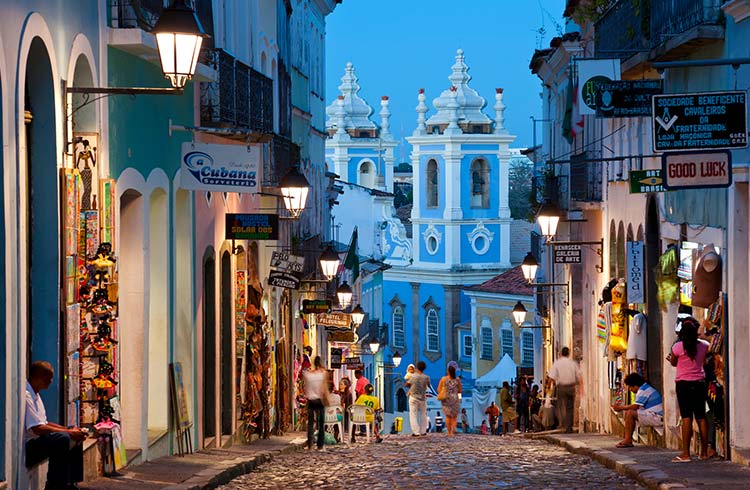Is Brazil Safe for Travelers? Essential Travel Safety Tips
How safe is Brazil for travelers? From crime and transport safety to card fraud and the risk of theft, this is what you should know before you go.
 Photo © Photo by sergio souza on Unsplash
Photo © Photo by sergio souza on Unsplash
Since my first trip to Brazil, more than a decade ago, I’ve lived in three of the country’s 26 states and visited another 14. I’ve made friends, fallen in love, become a father to a beautiful bilingual daughter, and we all wake up here every day happy to call it lar doce lar (home sweet home).
Yet, I’m not blind to Brazil’s safety concerns. There is huge socio-economic disparity and it trickles down into every facet of local life, from education and employment to housing and healthcare. Brazil ranked 7th on Forbes’ Billionaires List for 2024, yet minimum wage in the country remains less than US $1.18 per hour.
With a population of 215 million, and such a large wealth gap, societal issues are inevitable. However, there are various measures you can take to limit your chances of trouble and stay safe to ensure you get the most from your trip to this colorful, culture-rich country.
- Risk of theft in Brazil
- Card fraud in Brazil
- Are Brazil’s favelas safe?
- Transport safety in Brazil
- How to stay safe in Brazil by day and night
- Is Brazil safe for solo women travelers?
- Is Brazil safe for LGBTQ+ travelers?
- So, just how safe is Brazil for travelers?
Risk of theft in Brazil
The first night I met my fiancée — New Year’s Eve, 2015, on Copacabana Beach — she was brazenly approached by a young guy suggesting they team up to relieve me of my possessions. When she declined, he followed up by requesting we watch his rucksack while he swam in the Atlantic. He was the epitome of an opportunist.
When it comes to theft in the country, it’s worth remembering our swimming villain. Wealth disparity means opportunistic crime is rife, so leave your jewelry at home. I've lost count of the number of times I've seen people have necklaces snatched. Same goes for cell-phones: use them sparingly in public and always be aware of your surroundings when taking photos. Don’t think yourself too cool for a money belt, and it’s good practice to fold your notes with the smallest denominations on the outside.
It should go without saying too, but let’s just drill it home, that if you are mugged, don’t fight it — whatever you are set to lose has less value than your life.
Card fraud in Brazil
Brazil is one of the top 10 countries in the world with the highest credit card fraud rates. As well as online hacking, criminals are known to affix physical devices and cameras onto ATMs to clone your card and pin.
These can often be removed with a bit of force so always give the card reader a shake before starting and cover your pin with your hand. Better yet, stick to machines that are well-lit and have camera surveillance as not only are they less likely to have been meddled with, you’ll also be safer when withdrawing. I've had my card cloned twice, and while I got the money back both times, it's a hassle.
That should not mean you become paranoid about your plastic though. Portable card readers are prevalent throughout Brazil and usually with no minimum spend. Once, while sat in my car stuck in traffic, I had a guy offer to wash my windows for some loose change. When I told him I had no coins, he pulled out a card machine. So long as you keep your card in your possession and confirm the price on the screen before entering your pin, there’s little risk involved.
Traveling to Brazil soon? Learn how travel insurance could help on your trip.
Are Brazil’s favelas safe?
The number of Brazilians living in slum-like conditions in favelas totals 16 million. Unsurprisingly then, while favelas are often represented as ramshackle hovels filled with poverty, drugs and gun violence, there is more to them than the stereotypes.
Gourmet restaurants, art clinics, jazz clubs, boxing gyms, and floodlit football pitches can all be found crammed between the open-brick buildings and corrugated roofs. Since many are located on hillsides, favelas also offer some of the best views, yet reputations exist for a reason and the vast majority of Brazil’s 41,635 murders in 2019 occurred there.
No two favelas are the same, so do your homework. Aside from being labyrinthine, even in the “pacified” neighborhoods that run daily tours, gun violence remains troublingly commonplace between residents and trigger-happy police. Check with apps such as Onde Tem Tiroteio (Where the Shootouts Are) for up-to-the-minute information.
Transport safety in Brazil
With plug sockets, Wi-Fi and occasionally even snacks, coach travel is a great way to get around Brazil at a leisurely pace. Don’t store your valuables in the hold and keep hand luggage nearby rather than on the storage shelf, where it can disappear if you nod off.
While generally safe, coaches have been known to be targeted by hijackers — especially in the north. A friend lost almost everything when he was hijacked in 2017, saving his wedding ring by hiding it in his mouth. More than likely, the worst you’ll experience is just a runny nose from the Arctic air-con.
Likewise, if you’re not using ride-share apps like Uber and 99 Cabs, now is the time to start — not only are they cheaper and safer, but the perks are better in Brazil than most other places, with drivers offering ice cold water, sweets, and sometimes even mobile Wi-Fi.
Meanwhile, taxis are renowned for a variety of scams. If you pay with cash, watch out for drivers swapping your larger notes for fakes before blaming you. Others process your card, but add one or two zeroes to the tariff. Worse still, some charge it normally, but hand back a random card before going on a spree with yours.
How to stay safe in Brazil by day and night
Large-scale gatherings are commonplace even outside Carnival, especially with the polarized political situation. Yellow has come to represent the current government, while red is that of the Workers Party, so read the news and be aware of what’s going and any heightened tensions. Then avoid protests regardless.
If you’re going to the beach — and let’s be honest, who visits Brazil and doesn’t go to the beach? — only take the essentials with you, and never leave them unattended. The manifestation of large groups of thieves swarming the area grabbing everything in sight is common enough to have its own name: an arrastão. It’s a “big drag” by name and, if you lose your valuables, a big drag by nature.
Just like anywhere else in the world, trouble is more likely to find you if you’ve been drinking alcohol. That doesn’t just mean you should drink responsibly, but also watch your drinks. Surprisingly, the infamous date-rape drug Rohypnol is legal in Brazil and available with a prescription. Causing extreme drowsiness in 30 minutes and often a loss of memory, the sleeping tablet known here as Boa Noite, Cinderella (Good Night, Cinderella), is popular with thieves and sexual predators.
Is Brazil safe for solo women travelers?
Someone is sexually assaulted every eight minutes in Brazil and the vast majority are women. While I, as a white man who can speak the language, have never felt threatened in that sense, several Brazilian women have told me not only do they never walk at night unaccompanied, but they also avoid using ride-sharing apps or taxis if alone.
Unfortunately, leering and catcalls should be expected, but it should be limited to that so long as there are others around. Brazil has a free 24-hour hotline dedicated to serving women in need of assistance. Just dial 180.
Is Brazil safe for LGBTQ+ travelers?
In 2012, LGBTQ+ app Grindr named São Paulo the host of the world’s best gay parade and Rio as having the best gay beach. By 2018, the Brazilian Government had officially certified seven cities as “gay-friendly” and Pabllo Vittar, a gay drag queen, was one of the hottest pop stars in the country.
Yet the number of crimes based on sex and gender has been steadily rising. In 2019, 329 LGBTQ+ people suffered violent deaths, while a year later transgender murders in Brazil — already the world’s deadliest country for trans — had increased by 70%.
So, just how safe is Brazil for travelers?
Brazil is an amazingly diverse country. Apply common sense and take heed of the advice above and you’ll be unlikely to run into trouble. Only 7% of Brazilians speak English so it’s a good idea to learn some Portuguese phrases. Not only will it open doors, it’ll also help in an emergency. Just don’t confuse pão and pau…
Related articles
Simple and flexible travel insurance
You can buy at home or while traveling, and claim online from anywhere in the world. With 150+ adventure activities covered and 24/7 emergency assistance.
Get a quote

No Comments